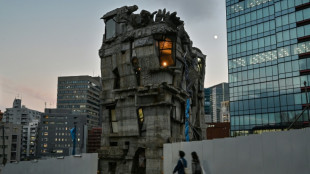
-
 'Very, very slow': plastic treaty talks grind forward
'Very, very slow': plastic treaty talks grind forward
-
Australian cop guilty of manslaughter after tasering 95-year-old

-
 Trump names trade envoy, top economic advisor to fill policy team
Trump names trade envoy, top economic advisor to fill policy team
-
China expected to hit peak coal consumption in 2025: report

-
 What to expect from the new EU top team's first 100 days
What to expect from the new EU top team's first 100 days
-
New EU commission to get all clear as daunting task awaits

-
 German family winery taps into zero-alcohol trend
German family winery taps into zero-alcohol trend
-
World leaders react to Lebanon war ceasefire

-
 Paddington: the affable bear who became a lucrative business
Paddington: the affable bear who became a lucrative business
-
Hand-built fantasy tower brings value to Tokyo, creator says

-
 Asian markets mixed as traders eye fresh trade tensions
Asian markets mixed as traders eye fresh trade tensions
-
Ceasefire begins in Israel-Hezbollah war

-
 Banned Ryan Garcia eyes New Year's Eve exhibition in Japan
Banned Ryan Garcia eyes New Year's Eve exhibition in Japan
-
In US, a guitar trademark feud gets political

-
 China investigates defence minister for corruption: report
China investigates defence minister for corruption: report
-
'American Railroad' musical project showcases untold immigrant stories

-
 Future of deep-sea mining stands at a crucial juncture
Future of deep-sea mining stands at a crucial juncture
-
Australia marks 10 years since death of cricketer Phillip Hughes

-
 Russia accuses UK diplomat of spying in fresh diplomatic spat
Russia accuses UK diplomat of spying in fresh diplomatic spat
-
Teen who lied about beheaded French teacher's class says 'sorry'

-
 Drake takes Kendrick Lamar rap feud to US courts
Drake takes Kendrick Lamar rap feud to US courts
-
Bolivia announces $1 bn deal with China to build lithium plants

-
 NFL-best Chiefs and Lions face short-rest US holiday test
NFL-best Chiefs and Lions face short-rest US holiday test
-
Alleged smuggler had meth-soaked cow onesie in suitcase: US officials

-
 Man City blow three-goal lead in Champions League, Bayern beat PSG
Man City blow three-goal lead in Champions League, Bayern beat PSG
-
Arsenal deliver Champions League statement of intent: Arteta

-
 Flick hails 'unbelievable' Lewandowski after 100th Champions League strike
Flick hails 'unbelievable' Lewandowski after 100th Champions League strike
-
Man City not 'stable', says Guardiola after Feyenoord collapse

-
 US stocks rally despite Trump tariff threat but European stocks fall
US stocks rally despite Trump tariff threat but European stocks fall
-
Ceasefire to begin in Israel-Hezbollah war

-
 League fines Hawks $100,000 for Young missing NBA Cup game
League fines Hawks $100,000 for Young missing NBA Cup game
-
Man City blow 3-0 lead to extend winless run in Feyenoord thriller

-
 Kim heads Bayern past 10-man PSG to dent Champions League hopes
Kim heads Bayern past 10-man PSG to dent Champions League hopes
-
Lewandowski hits Champions League century as Barca beat Brest

-
 Inter take Champions League lead with narrow win over Leipzig
Inter take Champions League lead with narrow win over Leipzig
-
Arsenal crush Sporting in Champions League to extend revival

-
 Ceasefire in Israel-Hezbollah war to take effect
Ceasefire in Israel-Hezbollah war to take effect
-
Egyptian clubs go on scoring sprees in CAF Champions League

-
 Biden hails Lebanon ceasefire deal as 'good news'
Biden hails Lebanon ceasefire deal as 'good news'
-
Brazil's Bolsonaro 'participated' in 2022 coup plot against Lula: police

-
 Barcelona striker Lewandowski scores 100th Champions League goal
Barcelona striker Lewandowski scores 100th Champions League goal
-
Alvarez, Correa net braces as Atletico thrash Sparta in Champions League

-
 Autos, food: What are the risks from Trump's tariff threat?
Autos, food: What are the risks from Trump's tariff threat?
-
Alvarez, Correa net braces as Atletico thrash Sparta Prague

-
 Trump brings back government by social media
Trump brings back government by social media
-
Animal rights activist on FBI 'most wanted terrorist' list arrested

-
 Netanyahu seeks ceasefire after two months of war in Lebanon
Netanyahu seeks ceasefire after two months of war in Lebanon
-
Trump tariffs threat casts chill over Canada

-
 Hong Kong tycoon Jimmy Lai's court case a 'show trial': son
Hong Kong tycoon Jimmy Lai's court case a 'show trial': son
-
Blinken says Lebanon ceasefire talks 'in final stages'

| RBGPF | 100% | 60.1 | $ | |
| CMSC | -0.65% | 24.57 | $ | |
| SCS | -1.33% | 13.54 | $ | |
| RELX | 0.51% | 46.81 | $ | |
| RYCEF | -0.29% | 6.78 | $ | |
| BCC | -2.76% | 148.41 | $ | |
| RIO | -1.53% | 62.03 | $ | |
| NGG | -0.68% | 62.83 | $ | |
| JRI | -0.98% | 13.24 | $ | |
| CMSD | -0.61% | 24.43 | $ | |
| BCE | -1.46% | 26.63 | $ | |
| VOD | -0.56% | 8.86 | $ | |
| BTI | 1.01% | 37.71 | $ | |
| AZN | -0.06% | 66.36 | $ | |
| GSK | -0.38% | 34.02 | $ | |
| BP | -1.24% | 28.96 | $ |

Why Greeks still love their smashing nights out
A Greek crooner is showered in red and pink carnations by customers in an Athens taverna as they sway to his songs of love and passion.
But suddenly the flower-throwing of fans in high heels and sparkly lame outfits gives way to a wild crescendo of plate smashing.
Piles of crockery are broken at the singer's feet -- a decades-old tradition of late-night folk revelry that has survived dictatorship, the Greek debt crisis and now Covid.
"The Greek mentality is different from that of foreigners. When it comes to entertainment... you have to have a lot of noise," said Christos Gounaris, who manages singers on the Athens folk scene.
It is the night of the Epiphany, a major religious holiday in Greece, and large tables are set out in front of the stage of the tavern in Peristeri in the working-class west of Athens.
Late-night bouzouki taverns like this named after the lute-like instrument originally brought over by Greek refugees from what is now modern Turkey in the 1920s.
The singer in the leopard-print shirt bringing the place to its feet is Pavlos Spiropoulos, who drives a truck during the week and sings long, tragic love songs at the weekend.
"When people throw plates and flowers at me I feel happy, because I feel I'm doing a good job and that the public loves me," said the 51-year-old, who has been singing since the age of 18.
- 'Let off steam' -
Breaking plates "is a way for customers to let off steam", adds the tavern's 56-year-old owner Vassilis Miggas.
"It's also a way to show the singers: 'You're good, I like that!'" he told AFP.
"We throw flowers and plates for those who put the most passion" into their performance, said Gounaris.
Plates are also broken at weddings to bring good luck to the bride and groom, or at christenings.
For some, breaking plates and throwing flowers is a way of showing wealth and social status. But now they are often included in the bill, costing the owners three euros or so a dozen before tax.
The practice reached its zenith in the 1960s, its popularity bolstered by appearances in iconic films such as "Never on Sunday" starring legendary Greek actress Melina Mercouri, with its theme song winning an Oscar in 1961.
At the time, 100,000 plates were broken every month and dozens of small companies sprang up to mass produce the made-to-break crockery, according to the Piata yia spasimo company, whose name means "Plates for smashing".
Based in nearby Piraeus, the family-run company, founded over 40 years ago, is one of the very last still making these plaster plates.
There is no definitive theory on the origins of the custom.
Gounaris said it evolved in the 1930s out of a previous tradition of knife-throwing.
"But people got hurt," he said, with patrons then throwing balloons and chocolates before settling on plates.
- 'We forget our problems' -
Today the tradition is also a draw for tourists in some of the taverns in Athens's historic district of Plaka, or on islands popular with revellers such as Mykonos.
But it has also clung on among Greeks, weathering the ups and downs of the country's history even if it has lost some of its popularity amid safety concerns for artists.
Banned by the military dictatorship that seized power in 1967, Greeks started smashing plates again as soon as democracy was restored in 1974.
The squeeze on incomes during the near-decade-long Greek debt crisis was a blow, as was the Covid pandemic that forced restaurants, bars and entertainment venues to close for months.
But Spiropoulos is not worried.
"We're full (tonight)," he said.
In Greece "we drink, we go out to forget our problems!" he shouted.
F.Müller--BTB


